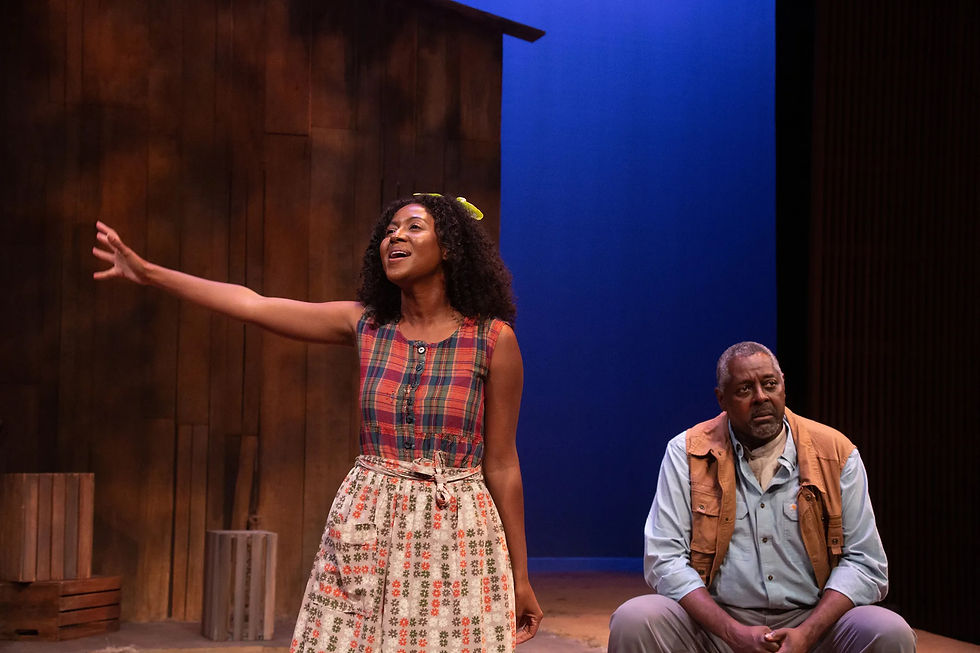REVIEW: “VALLEY SONG” — International City Theatre @ Long Beach Convention & Entertainment Center
- TheShowReport

- Sep 8, 2022
- 6 min read
Updated: Sep 12, 2022

First performed in 1995 and published in 1996, “Valley Song” was written by South African playwright, Athol Fugard. Fugard describes himself as a “classic example of the guilt-ridden impotent white-liberal of South Africa” and often reflects on the systemic evil of apartheid and its legacy in South Africa through his writing.
When “Valley Song” premiered at the Market Theater in Johannesburg, Fugard directed and also starred in the double role of Buks and the Author. That production went on to tour the U.S., including the Manhattan Theatre Club, the Kennedy Center and Mark Taper Forum. Born in 1932, Fugard grew up to become the most renowned playwright of South Africa. His plays make powerful pleas for racial equality and harmony in a land torn by intolerance, resentment and discrimination. Born in the Karoo, the isolated, semi-desert farmland in which Valley Song is set, Fugard has seen the dismantling of the apartheid policy of racial segregation in South Africa, and has since continued to comment on a political scene and through his works.
The play is a two-actor, three-character one-hander, which stars Michael A. Shepperd as both The Author and Abraam “Buks” Yonkers (a seventy-six-year-old self-described “Colored” tenant farmer), and Belle Guillory as Buks’ seventeen-year-old granddaughter, Veronica. The story deals with the conflicts that arise for Buks and Veronica when a white man expresses interest in buying the Landman estate where they live. Buks worries that the new owner will not allow him to continue sharecropping on his land while Veronica dreams of the possibility of escaping the village of New Bethesda and The Karoo (a desert-like region in central South Africa) entirely.

As the play opens, Mr. Shepperd as The Author presents the exposition of the story while holding a handful of pumpkin seed, speaking of spring and rebirth in the Karoo, a vast, arid territory in the middle of South Africa; the seeds become a recurring metaphor as the drama unfolds. Delivering his monologue, Mr. Shepperd slowly reaches for a hat in his pocket and transforms into Buks, singing a song he learned from an Italian POW. Veronica calls Buks in for lunch and they talk about the white man who has been to visit their property three times now.
Their conversation ripe with the clichés of intergenerational drama, he is staked to his memory, some long-standing simple dreams of land and family tempered by the harsh realities of life with whites. Buks is also haunted by his daughter’s rebellious and fatal flight to the city. Veronica has no past to bear. She literally sings her future, with “big dreams” of music stardom unattainable in the valley. The contrapuntal beat of age and youth, tradition and dream, thrums at the surface of the play.

But the Author’s presence lingers and returns intermittently with each doff of the knit cap. Mr. Shepperd gives two very different performances, amazing not least because the transformation of Author and Farmer often occurs between sentences, in the space of a short pause between words. In one dazzling sequence, the Author confidently speaks and stands in the flood of wide white spots. But as the light shifts to cobalt blue, he folds in upon himself. The set seems to shrink to the farm’s back room late at night. The Author falls to his knees and becomes Buks, hands clasped toward heaven and calling weakly to his dead wife. The back-and-forth of these dual roles complicates the manifest plot of familial struggle and allows for other readings of the action.
To Veronica, however, the two men may as well be the same person. Throughout, Buks bends and bosses, demanding that his granddaughter confine her singing to their garden or the local choir. While the Author stands and engages Veronica in well-meaning discussion of her plans, he still patronizes her with aged truisms about the danger of an overly-fertile imagination. She argues with the voice of the old, white or black. Being the stand-in for South African youth is a difficult task, but Ms. Guillory is a whirling dervish. She sings, stomps, smiles, and storms around the stage and clearly overshadows the other two characters. And her performance is perfectly pitched, with just enough bravura and generosity to affirm the inevitable future without erasing the power of the past.

When Buks hallucinates that she is his wife, Veronica softly walks around the old man, speaking her name and touching him lightly, drawing him back to the present. Ms. Guillory carefully centers her role not in the flash of Veronica’s dances but in those quieter, more passive moments.
It’s a play in which change is everywhere, and in which the comfort of the old — even when the old is as hopeless as life under racist law — must give way to the uncertainty of the new — even when the new means separation and loneliness.
“I’m not as brave about change as I would like to be,” Buks says to Veronica, the granddaughter he has raised from infancy. “It involves letting go, and I’ve discovered that that is a lot harder than I thought it was.”
How much history is packed into those words. And playwright Fugard, as a white South African, has been the chief witness to the human wreckage that was the result, as well as the legacy, of apartheid, having written plays such as “The Blood Knot,” “Boesman and Lena” and “A Lesson From Aloes” helping to give the current piece on stage now an even greater resonance. “Valley Song” is as traditional as it is joyous, as upbeat as it is sentimental; it’s a play with heart. It could very well even be a parable: Veronica representing the spirit of the “new” South Africa; Buks, the old.
Perhaps no other playwright of our time so deftly interweaves the political with the personal— an elegy in praise of the fertile land around the village of Nieu-Bethesda (white population, 65, mixed-race, 950). Buks, has spent most of his life as a tenant farmer on a small plot of land there. Now the sale of that property can uproot not only his small family, but his whole way of life.
But Buks' worst fear is that Veronica will leave him, which is of course exactly what she wants to do. Not for want of love — they have a rich, warm relationship. But the girl wants to go to Johannesburg to train as a singer, while the city where his daughter died so many years ago represents only heartbreak to Buks. He’d prefer Veronica become a maid in the new owner’s house, an idea that sends her into a rage; were the race laws abolished for nothing?
“You will never see me barefoot, carrying wood on my head with a baby on my back,” she says. “You will never see me on my knees scrubbing a white man’s floor.”
Michael A. Shepperd essays the two male roles with poise and grace, and Belle Guillory as Veronica is the role in which this talented actress comes fully into her own. She commands the stage with a completely seductive blend of fearlessness and self-deprecating humor.
“You’re breaking my heart,” she sings to Buks (Veronica has a habit of making up songs on the spot) — unable to keep a smile from crossing her face. It’s a very physical, intimate performance, and there’s a winning comfort level between Mr. Shepperd and Ms. Guillory; you fully believe this old ex-army corporal has actually raised this spirited girl, that they’re family.
Yuri Okahana-Benson’s set and Kim DeShazo’s costumes are unerringly simple — a façade of an old cabin, comfort clothes — as is Crystal R. Shomph’s soft lighting scheme. Sound designer is Dave Mickey, the prop designer is Patty Briles, and hair and wigs designer is Anthony Gagliardi. Casting is by Michael Donovan, CSA and Richie Ferris, CSA. Production stage manager is Sarah Dawn Lowry.
International City Theatre’s Production of VALLEY SONG by Anthony Fugard, directed by artistic director caryn desai, starring Belle Guillory and Michael A. Shepperd, runs Thursdays, Fridays and Saturdays at 8 p.m. and Sundays at 2 p.m., August 26 through September 11. Tickets are $49 on Thursdays, Fridays and Saturdays, and $52 at Sunday matinees. International City Theatre is located in the Long Beach Convention & Entertainment Center at 330 East Seaside Way, Long Beach, CA 90802. To purchase tickets and for more information, including up-to-date Covid-19 safety protocols on the day of each performance, call (562) 436-4610 or go to www.InternationalCityTheatre.org.
Chris Daniels
Arts & Entertainment Reviewer
The Show Report









Comments